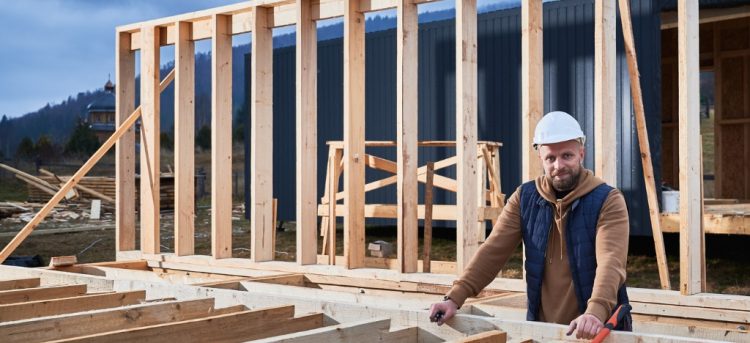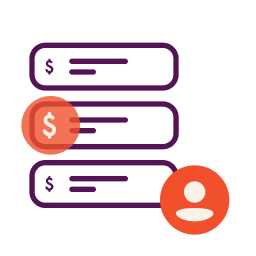If you’re a real estate investor or a new homebuyer looking to create a dream home, a self build construction loan may be the right option. With this type of construction loan, you can build a new home and save money by acting as your own general contractor. If you already have homebuilding experience, you may be able to qualify for a self build construction loan.
In this article, we explain what a self build construction loan is, how homebuyers and real estate professionals can qualify, and what it costs.
What Is a Self Build Construction Loan?
A self build construction loan is a specialty loan that borrowers use when they plan to build a residential home and act as the general contractor during the construction process. It’s also called a DIY home build loan or an owner builder construction loan.
To qualify for any kind of construction loan, you usually need a qualified builder — meaning a licensed contractor with demonstrable experience building homes — to sign on to lead the project. With a self build construction loan, you’re acting as your own general contractor.
You’ll usually have to provide proof that you know how to build houses for the lender to approve your loan. You may need to have:
- A license
- Construction insurance
- A detailed plan for the construction process
- Experience with building homes
If you have had experience building homes and managing subcontractors in the past and you have the necessary documents, you may be able to obtain a self build construction loan. It could be a good fit when other small business loans can’t fulfill your real estate development needs.
How Do Self Build Construction Loans Work?
A construction loan can be more difficult to qualify for than other housing loans because of several factors. First, mortgage lenders are being asked to hand out money for something that hasn’t been built yet — there’s inherent risk in a construction loan since there’s no collateral in your house to fall back on. The current housing market, with its rising cost of goods and frequent shipping delays also aren’t helping. These factors make self build construction loans more risky to lenders than a traditional mortgage loan.
Once you’re approved for a self build construction loan, you don’t get the money in a lump sum like when you buy a house that’s already built. Instead, the money is distributed as building progresses. You can’t use the funds toward home design or furniture — but expenses like home appliances count as construction costs. Because you’ll supply a timetable for the planned construction period before getting the loan, you’ll want to ask your lender what happens if you run into delays or go over budget.
When you finish building, the construction loan is due — but you don’t have to pay it off right away. Instead, you can convert into a traditional mortgage through a refinance if you’re buying or put the house up on the market if you’re selling. Then the homebuyer will begin making regular monthly payments.
A construction loan can cover the cost of land and permits. But because the land purchase is usually the most expensive part of the home build process, you could consider buying the land first using a land loan or a blanket loan if you’re a developer. The easiest option is to look for build-ready lots that are already permitted and have all the hookups you need. But if you have time, you may be able to add those yourself.
Common Terms, Rates, and Fees of Owner Builder Loans
Just because it’s harder to qualify for a self build construction loan doesn’t mean it’s impossible. Lenders usually offset their risk by making it more expensive for borrowers to take out these types of construction loans. You’ll often have higher mortgage rates and down payment requirements. On the plus side, these are short-term loans, so payment is usually due within a year, or once the construction phase is over. So you would only pay the higher interest while building the new house.
With a self build construction loan, the down payment may fall between 20% to 25%. And as mentioned, your loan rates will probably be higher with a home construction loan, but the exact rate you can get varies based on your financial details.
Like with a standard mortgage, you’ll also pay closing fees for things like the appraisal, title searches, and administrative expenses. These cost about the same as a regular mortgage, around 2% to 6% of the loan amount. Developers can avoid paying multiple closing costs by using a blanket loan. Homebuyers may be able to avoid paying closing costs twice by using a construction-to-permanent mortgage that has a one-time close. A construction-to-permanent loan automatically converts to a mortgage, but your interest rate will probably be higher. It’s best to compare the total cost of each type of loan before making your decision.
What It Takes to Qualify for a Self Build Construction Loan
It takes a lot of work to prove to a lender that a self build construction loan isn’t too risky of a project to take on and that you can manage to finish it. First, you’ll likely need to have a good to excellent credit score to qualify for this type of construction loan. The lender will look also at your debt-to-income ratio, cash reserves, and your down payment compared to the project costs to ensure you can repay what you owe.
To make yourself look as prepared as possible, you can make a “blue book” that details all the factors and features of your construction project. Work with a builder or learn how to do it yourself.
It may be faster for pre-qualified borrowers to get an owner builder loan. When you get pre-approved, the lender has already looked into your financials and decided whether or not you are a good candidate for a loan. This step can speed up the final process significantly.
How to Qualify for Owner-Builder Construction Loans
Construction loan lenders typically have specific criteria and requirements for owner-builder loans.
Here are some general steps and considerations:
- Check eligibility requirements: Requirements may vary, but common factors include credit score, income, debt-to-income ratio, and the value of the land.
- Understand your creditworthiness: A good credit score is crucial when applying for any loan. Lenders want to ensure that you have a history of managing credit responsibly.
- Verify income and employment: Lenders will want to verify your income and employment to ensure you have the financial means to repay the loan. This may involve providing tax returns, pay stubs, and other financial documentation.
- Create a construction plan: Present a detailed construction plan, including a timeline, budget, and scope of work. Lenders want to see that you have a realistic plan for completing the project.
- Have equity in the project: Lenders may require a certain amount of equity in the project. This could be in the form of a down payment or existing equity in the land.
- Appraise the property: The lender will likely require an appraisal of the property to determine its current value and the potential value after construction. This helps them assess the risk associated with the loan.
- Legal requirements: Be prepared to comply with local building codes, zoning regulations, and any other legal requirements for construction projects. Lenders want assurance that the project will meet all necessary standards.
- Get insurance: You may be required to get builder’s risk insurance to protect against losses during construction.
- Know the loan-to-value ratio: Lenders often have a maximum loan-to-value (LTV) ratio, which is the ratio of the loan amount to the appraised value of the property. Make sure your project falls within the acceptable LTV range.
- Have financial reserves: Having financial reserves can demonstrate your ability to handle unexpected costs that may arise during construction.
It’s important to note that qualifying for owner-builder construction loans can be more challenging than getting a traditional mortgage.
What Are the Qualifications for Home Buyers Who Want to Be an Owner-Builder?
To get approved, you’ll need to meet the eligibility requirements of the loan you’re applying for. Owner-builder loans have unique requirements, including:
- A construction plan: You’ll need to put together a detailed plan for your construction process, including who will be involved, what materials you’ll use, the timeline of the work, and more.
- Good credit: If your credit is fair or poor, you may need to spend time building up your personal and business credit scores before you apply. Your personal credit scores can impact your ability to qualify for business loans.
- A higher down payment: It’s possible to get a traditional mortgage these days with as little as 3% for a down payment, but owner-builder loans usually require much higher down payments. You might need to put down between 20% and 30% to qualify.
- Owner-builder experience: Lenders may require evidence of your experience in construction or proof that you have a qualified team of professionals to help you. This could include contractors, architects, and other professionals who will contribute to the project. If you’re not experienced in construction, you might have to hire pros or consider other financing options.
What Is the Lowest Credit Score for a Construction Loan?
The minimum credit score required for a construction loan can vary depending on the lender and the specific type of construction loan you are applying for. However, in general, lenders typically look for higher credit scores for construction loans compared to traditional mortgages.
A credit score is a numerical representation of a borrower’s creditworthiness, and it’s based on factors such as payment history, credit utilization, length of credit history, types of credit in use, and new credit. Construction loans involve more risk for lenders, as the collateral (the completed home) doesn’t exist at the time of loan approval, making creditworthiness an even more critical factor.
While specific requirements can vary, a credit score in the range of 680 to 720 or higher is often considered good for qualifying for a construction loan with competitive terms. Some lenders may accept lower scores, but they might come with higher interest rates or require a larger down payment.
Keep in mind that credit score requirements are just one aspect of the overall criteria lenders consider when approving construction loans. Other factors, such as income, debt-to-income ratio, the value of the land, and the construction plan, also play a significant role in the approval process.
What Is the Minimum Down Payment for a Construction Loan?
The amount you’ll be required to put as a down payment for a construction loan can vary depending on the type of loan, the lender’s requirements, and other factors. Construction loans are generally riskier for lenders compared to traditional mortgages because the collateral — the completed home — doesn’t exist at the time of loan approval. As a result, down payment requirements for construction loans are often higher.
Traditional construction loans
Traditional construction loan programs may require a down payment of 20% to 30% of the total project cost. This includes the cost of the land, construction expenses, and contingency funds.
FHA construction loans
If you’re eligible for a construction loan insured by the Federal Housing Administration (FHA), the minimum down payment requirement may be lower than that of traditional loans. FHA loans typically require a down payment of 3.5%, but the total loan amount, including the land purchase and construction costs, must still fall within FHA loan limits.
VA construction loans
For eligible veterans and active-duty military personnel, the U.S. Department of Veterans Affairs (VA) opens up construction loan opportunities with favorable terms. The down payment for a VA construction loan is often lower than what is required for conventional loans, and it may be possible to finance 100% of the construction costs.
USDA construction loans
The U.S. Department of Agriculture (USDA) also offers construction loans with low down payment options for eligible borrowers in rural areas. Like VA loans, USDA loans may allow for 100% financing.
How to Apply for a Self Build Construction Loan
Before applying, you can use an online calculator to figure out how much you need to borrow. It’s best to assume your project will go over budget to avoid running into any issues with funding. Because you only pay interest during the build, current homeowners may have the ability to afford to stay in their current homes until their new house is finished.
Once you’re ready to apply for a self build construction loan, you’ll need to gather the documents that each specific lender requires. You’ll be required to present more documents if you’re acting as your own general contractor, such as:
- Your personal finance information, like your bank records and your social security number
- Your construction license
- Your plan for construction, or “blue book”
- Proof of insurance and building credentials
- Prepaid homeowners insurance
If you have already pre-qualified, you’ll have a better idea of how much you’ll be able to borrow.
Other Options for Real Estate Investors
Investing in real estate can be costly. If your business needs additional funding while you’re in the homebuilding process, use Nav to see what you can qualify for before you apply. Nav uses your business’s details to help you see which financing is the right fit.
FAQs
Do you have to have a down payment for a construction loan?
To qualify for a self build construction loan, you’ll usually need a down payment of between 20% to 25%. However, the federal government offers other types of construction loans to qualifying applicants through the USDA and the Department of Veterans Affairs that may not require any money down. If you can’t afford that high of a down payment to build your own home, there’s also the option to get a more affordable loan through the U.S. government.
Do you pay on a construction loan while building?
Typically, lenders only require that you make interest-only payments on the loan while you’re building. Your interest rate may be higher than with mortgages, but at least you don’t have to make full payments during the construction process. After building is complete (and the construction loan is probably turned into a mortgage), you’ll start making regular mortgage payments.
Is it harder to get a construction loan than a mortgage?
Yes. Because the home isn’t built yet, it’s riskier for a lender to offer you money for it. A standard mortgage funds a home that already exists that can act as collateral in case you can’t make payments on the loan. So a construction loan can be more difficult to obtain.
What is the lowest down payment?
If you qualify for a government-backed construction loan program, you may be able to avoid a down payment altogether. Otherwise, you’ll probably need to provide between 20% to 30% as a down payment for a traditional construction loan.
What credit score do you need for a construction loan?
FHA construction loans require a minimum 500 credit score for a loan with a 10% down payment, otherwise the minimum credit score for a lower down payment is at least 580.
Mortgage lenders typically require credit scores of at least 680.
Builders/real estate investors may be able to use hard money new construction loans which typically do not require good credit scores.
What are the typical terms of a self-build construction loan?
Self-build construction loans typically release funds in stages. Instead of getting a lump sum upon approval, the lender will release funds as certain milestones in the construction process are reached.
Instead of an appraisal, you’ll need to provide building plans with costs.
As mentioned above, these loans typically require a larger down payment than a traditional mortgage, and costs may be higher.
Can you roll a construction loan into a mortgage?
If you have a construction-to-permanent loan, you can roll your construction loan into a permanent mortgage without having to complete a loan application for a new mortgage or go through another closing.
Can you refinance a business loan with a mortgage?
It depends. Mortgages are loans secured with real property. Business loans may be secured or unsecured.
Whether you can refinance your business loan with a mortgage depends on whether you have property that can be used to secure a real estate loan, and whether the lender will allow you to refinance existing business debt with the new loan. And of course you must qualify for the new loan. Consolidating business debt can be challenging, and not all business lenders offer that type of loan.
Read our guide to refinancing business loans.
This article was originally written on May 13, 2022 and updated on February 28, 2024.





Have at it! We'd love to hear from you and encourage a lively discussion among our users. Please help us keep our site clean and protect yourself. Refrain from posting overtly promotional content, and avoid disclosing personal information such as bank account or phone numbers.
Reviews Disclosure: The responses below are not provided or commissioned by the credit card, financing and service companies that appear on this site. Responses have not been reviewed, approved or otherwise endorsed by the credit card, financing and service companies and it is not their responsibility to ensure all posts and/or questions are answered.